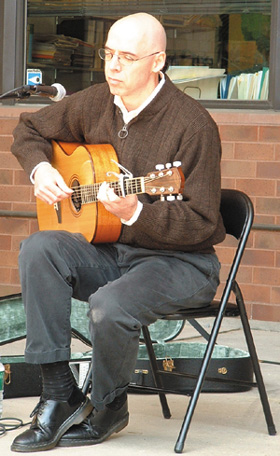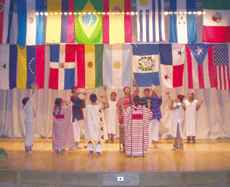An Interview: With Buitarist Peter Janson

Peter Janson
July 18, 2002
Two weeks ago I reviewed a performance by Peter Janson, a gifted solo guitarist and a professor of Music here at UMass Boston. That performance was both accomplished and intriguing, and afterwards I approached Mr. Janson, wondering if I could learn a little more about the man and his music. Although busy with lessons, Janson was gracious enough to invite me up to his office for a talk. There I learned that not only is Peter Janson a really nice guy, he is also an insightful artist with a very individual outlook.That sense of artistic individuality is something Janson learned from his father, also a solo acoustic guitarist, who taught him the importance of being himself. As a result, Janson’s music has a unique sound that defies any specific genre. I asked him if he could describe his style for me.Janson: It’s a very difficult to categorize style. It gets locked under a lot of names; people from different histories come up to me and they’ll say, “I like your style of classical playing” or “I like your style of jazz playing” or “I like your style of folk playing”…and really, it’s none of those; it’s one of these styles that kind of falls between the cracks. It’s got all those influences; my right hand technique is really strong in Classical and folk technique; my form and little bits of improvisation that I do are based in jazz. Sometimes the chords that I select are more jazz oriented…Evan: Is it a problem for you that people are trying to classify what you play?Janson: It’s no problem for me at all. It’s just me, you know, I’m just who I am and I’m just putting out the stuff that I want to put out…I’m not trying to fit in a niche or anything like that.Evan: In a way, it’s good when people aren’t able to pin you down as an artist.Janson: It might be, who knows, you know? To be honest, I don’t really concern myself with those kinds of things because I think when you do that then you’re going to lose that connection to just being yourself. And that’s where the real music comes from.I think marketing wise it is a problem; when I go and try to book myself for gigs, if I’m booking myself in coffee house and places like that, then usually the first response is, “I don’t think our people will like this kind of music”. But when I finally break through the door and get in there, it turns out that they do. And then I end up coming back. So, I’ve got the coffee house element that’s starting to recognize that although it [the music] is not strictly folk, it certainly has got so many elements of it that they can relate to it and enjoy it. In marketing for retail sales, they seem to want to place me under New Age, because there have been a slew of solo guitarists that aren’t folk guitarists or Celtic guitarists. Doyle Dykes and Alex DeGrassi, Will Ackerman, Michael Hedges, of course, and John Fahey…these people they put under the category of New Age, which is really weird because there’s a whole other section of New Age that’s the ambient, kind of…I don’t know how to describe it…very ethereal, not melodically based or rhythmically based music. And certainly there are small elements of that in my compositions too. Anyway, that’s where they put it. So, in a marketing sense, it’s kind of problematic. But, I don’t really care about that.Evan: How about teaching? Now that your performing career is taking off, do you plan to remain a teacher?Janson: Well, yeah, I don’t have any plans to have the performing end of things take over. My plans are to remain teaching; I love it, to be honest. And I really enjoy UMass because it’s such a diverse bunch of students; their backgrounds are so diverse. They’re older too, and I find that my style of teaching ends up working really well with them. When guitarists come to me, we deal with the real issues; it’s not just about technique, it’s about what makes it music, what makes it artistic. Those kinds of things. And with adults that are open to it, it works really well.Evan: That’s always a tough thing. It’s easy if you know the terminology to talk about music as a technical thing or as a form, but to really pose the question, “what is music?”, is hard. What’s your opinion on that?Janson: Oh, man. You’d have to give me a week to touch all the aspects of that…the artistic end of it to me means that it is more than a way to make money, and more than just a way to have fun…You can make money with it, you can have fun with it, those are cool things, but if that’s the only impetus, to me, its not artistic. It might be considered art, and if you’re truly a brilliant person it probably really is art and, who knows, it could be profound even though that’s not your intent. But for me, for something to be artistic is when you actually have that intention of creating music that connects with people, and that you are also always self searching, where you are trying very desperately to put out the stuff that’s really in you in a way that is communicative and not so self-indulgent. To me, then it crosses over that line and becomes artistic.Getting back to the technical end of teaching, what I try to advise my students on is that it doesn’t matter what the theory is behind what you’re doing; it matters whether or not you are communicating the message you are trying to communicate. Are you achieving that in your selection of notes, chords, rhythms and all the things that are the tools that make up music? That’s what I mean when I talk about making it more artistic, instead of just theoretical…It’s whether or not you know stuff-you have this bag of tricks, this bag of tools-and it’s where you go with that…Nobody goes and builds a house based on the size of their hammer. It just doesn’t make sense. Yet, there are people who do music that way, and it shows. It’s lacking in the potential depth that music has as an art form.Evan: You’ve switched back to the acoustic guitar after playing the electric for some time. Did you rediscover something about the acoustic guitar that brought you back?Janson: There’s something about the sonority of it…it’s really pliable to me, and I like the idea of not being reliant upon electricity all the time…I like the sound that I get from an acoustic instrument. That combined with the fact that I can really play a lot of stuff as a solo guitarist on the acoustic: I get a lot of the tones and colors that I really like, and the acoustic has enough variety in it for me. I really enjoy the idea of playing solo, and I think part of that is an expression of how I feel. I feel alone in the art world; I’ve always not followed along, and because of that, there was never really a group of musicians that I could associate with. You know, like saying, “Oh, I’m a folk musician” or “I’m a classical musician.” I’ve never been able to do that…So, I think that artistically it makes me feel like I am expressing myself much more truly when I’m by myself than when I’m playing with a group of people. I enjoy playing with a group, but this is just my preference. I think the acoustic guitar lends itself to that.Evan: It’s a more personal instrument.Janson: I think so. It is to me. I mean, electric guitar is a wonderful thing. It’s just not where I am now…I never really thought about that aspect of it. It was just something that happened. I was having so much joy from writing for the acoustic that I just knew my electric days were virtually done.





















































